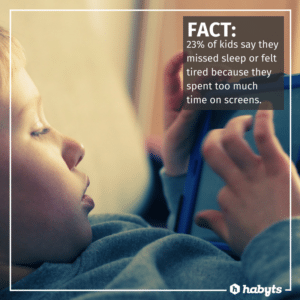“The earlier we introduce screens, the more it affects the child’s brain development and the more likely they will have trouble managing their addiction to screens and technology later in life.” – Dr Laura Markham, Aha! Parenting
There is no denying it. Kids – and their parents – are spending more and more time on screens than ever before. But what is the relationship between screen time and kids health? And should parents be worried?
According to market researcher conducted by Childwise in 2015, kids aged five-16 average 6.5 hours screen time a day, with teenage boys spending the most time on screens – an average of 8 hours a day. Thus, a typical teen can expect to spend upwards of 90 days – or 3 months – a year staring at a screen. That’s a 116% increase in screen time consumption since 1995.
And that’s not all. Kids are now adept at multi-screening – using two or more screens at the same time, for example, browsing the internet on a tablet while watching television. For more on screen time, download our free guide: Preparing your Kids for Screen Time Success.
But headline-grabbing statistics aside, there are a number screen time facts that are less well known. They affect our kids’ health and wellbeing. And we think you should know about them! So without further ado, here are our 5 lesser known facts about screen time and kids health:
#1 Tweens spend less time outside than prisoners
That’s less than one hour a day. These shocking stats were from a survey of 2,000 parents of 5 to 12-year-olds. The survey – part of Percil’s Dirt is Good campaign – revealed the following:
- Kids spend twice as long playing on screens as they do playing outside.
- 3-in-4 kids spend less than 60 minutes playing outside each day.
- 1-in-5 kids don’t play outside at all on a typical day.
- 3-in-4 parents said their kids often refuse to play games without some form of technology.
- 2-in-3 parents say their kids spend less time outside than they did as children.
These results were mirrored in a separate survey of 2,000 parents by the British Heart Foundation, Diabetes UK and Tesco which found 77% of kids don’t get enough physical activity. And a recent survey by the National Trust found, on average, kids played outside for just over four hours a week compared to 8.2 hours for the adults surveyed.
Richard Louv, author of Last Child in the Woods, defines the phenomenon as “nature deficit disorder”. Experts agree that unstructured play and physical activity are key to a happy, healthy childhood. But today’s kids are spending less time outdoors due to a combination of parental fear, lack of access to green space, mountains of homework, and rising screen time.
2) 1 in 4 kids think video games are exercise

That’s according to the Youth Sport Trust charity’s Class of 2035 report which explores the role of PE, sport, and physical activity play in the development of future generations. Ali Oliver, Youth Sport Trust CEO, warned that future generations would be ‘hostages to handheld devices’ and risk living their lives devoted to technology.
This is at a time when physical activity among youth is in decline. A recent study found kids become less active from the age of just seven, with the decline continuing into adolescence. Much of the damage was caused because of the amount of time kids spent on screens, as well as being driven to school instead of walking, experts said.
But it’s hardly surprising. Video games are a global phenomenon with over 1.2 billion gamers worldwide of all ages and genders. They are fun, immersive and demand concentration. They’re even an official Olympic Sport! A gold medal for Pokemon Go anyone?
The rise of interactive consoles (e.g.Wii Fit) and virtual reality (VR) will only blur the boundaries between gaming and exercise further. So it’s essential that kids are taught the difference between playing sport on a video game and physical exercise offline.
RELATED: Like what you're reading? Get your FREE Guide: How to Prepare Your Kids for a Screen Routine...that Works for YOUR Family!
Click here for your FREE Guide3) 4-in-5 tweens are on social media by age 12
With lots of tween on social, this fact about screen time and kids health might not come as a great surprise, but did you know the minimum age for a Facebook, Instagram or YouTube account is 13 years? A CBBC Newsround survey found 4-in-5 tweens had a social media account. It also found that more than 1-in-5 were victims of cyberbullying.
The most popular social media sites for under 13-years-olds was Facebook (49%), followed by Instagram (41%). But while social media is a popular form of screen entertainment for tweens, they don’t spend nearly as much time using social media as their older teen siblings.
Recent studies have shown kids who spend more time on social networks feel less happy in almost all aspects of their lives. And Facebooks recent introduction of a chat app aimed squarely at under-13’s has drawn criticism from child experts the world over.
So, if your tween already has a social media account or is expressing interest in joining, set time aside to discuss the pros and cons with your child. Common Sense media have developed some useful social media ground rules for parents to help you.
4) 6-in-10 kids don’t get enough sleep

…and 3-in-5 kids aged 2-11 don’t have a regular bedtime. That’s the results from a survey of 2064 parents by the Junior Fine Bedding Company. The survey found that sleep deprivation increased with age, from 57% among 2-4-year-olds to 65% among 8-11-year olds.
The findings are similar to a 2012 study by The Sleep Council which found lack of sleep among primary school aged kids impacted classroom performance.
“It would seem lack of sleep has now become so widespread in primary schools that nearly a quarter (24%) of the teachers questioned admitted that they had had to resort to letting children who are very tired sleep in a corner of the classroom.”
– The Sleep Council
Finally, the latest study from independent market research agency Childwise found 23% of kids have missed sleep and felt tired because they spent too much time on a connected device.
All three surveys point the blame firmly at screen time. Experts agree the use of screens before bed can impact upon sleep quality through a combination of:
- over-stimulation of the brain (and)
- blue light emitted from screens tricking our bodies into thinking it’s daytime.
So it’s essential to master a healthy – and flexible – screen time routine for your kids.
RELATED: Like what you're reading? Get your FREE Guide: How to Prepare Your Kids for a Screen Routine...that Works for YOUR Family!
Click here for your FREE Guide5) The average age for a child to get their first smartphone is 10.3 years (and falling)
That’s according to a recent study of 500 US mums by Influence Central which explores the increasing role technology now plays in the lives of today’s kids. (It’s well worth a read). Back in 2012, the average age of smartphone ownership stood at 12 years of age.
“I think that age is going to trend even younger, because parents are getting tired of handing their smartphones to their kids”
– Stacy DeBroff, Influence Central.
But the trend of increasing smartphone ownership among tweens is being met with resistance. Bill Gates, co-founder of Microsoft, recently told reporters that he didn’t let any of his children have a smartphone until they were 14 years old. And James P. Steyer, CEO of Common Sense Media, only gives his kids a smartphone when they start high school.
With more and more tweens owning smartphones, it’s even more important to teach healthy screen habits! If your thinking about buying your kids a smartphone, check out Common Sense Media’s blog 5 Questions to Ask Before You Get Your Kid a Phone.
So there you have it. 5 shocking facts about screen time and kids health you probably didn’t know.
To learn more about screen time and kids health, check out these posts:
- KIDS AND SCREEN TIME: WHAT PARENTS NEED TO KNOW
- 6 NEGATIVE EFFECTS OF TOO MUCH SCREEN TIME FOR KIDS
- CRACKING THE 7 MOST COMMON SCREEN TIME ISSUES (FINALLY!)
- WHY OLD SCHOOL PARENTING TECHNIQUES DON’T WORK FOR SCREEN TIME
this is epic
wow
So true
everyone should have a screen time limit on there screen console